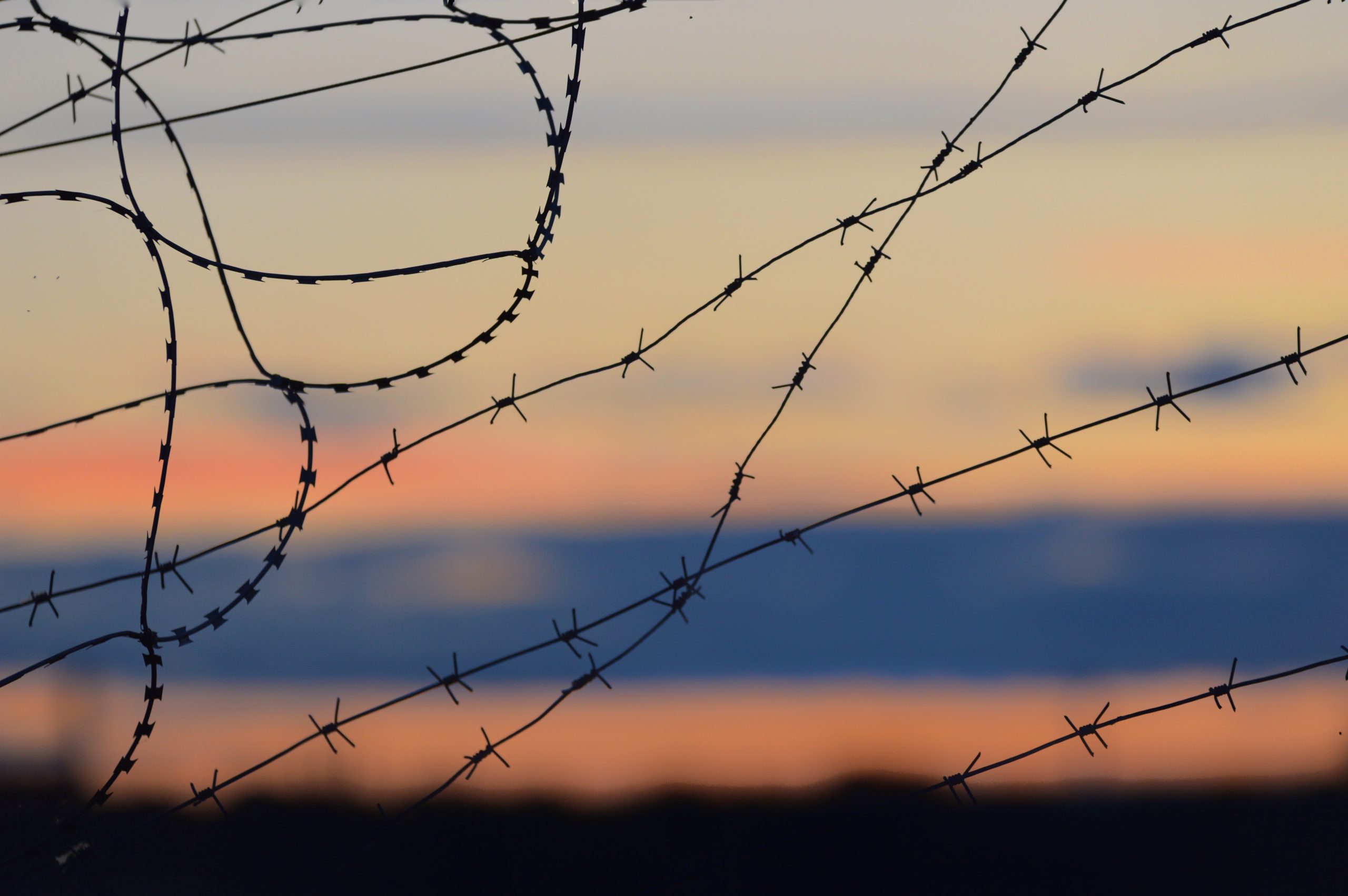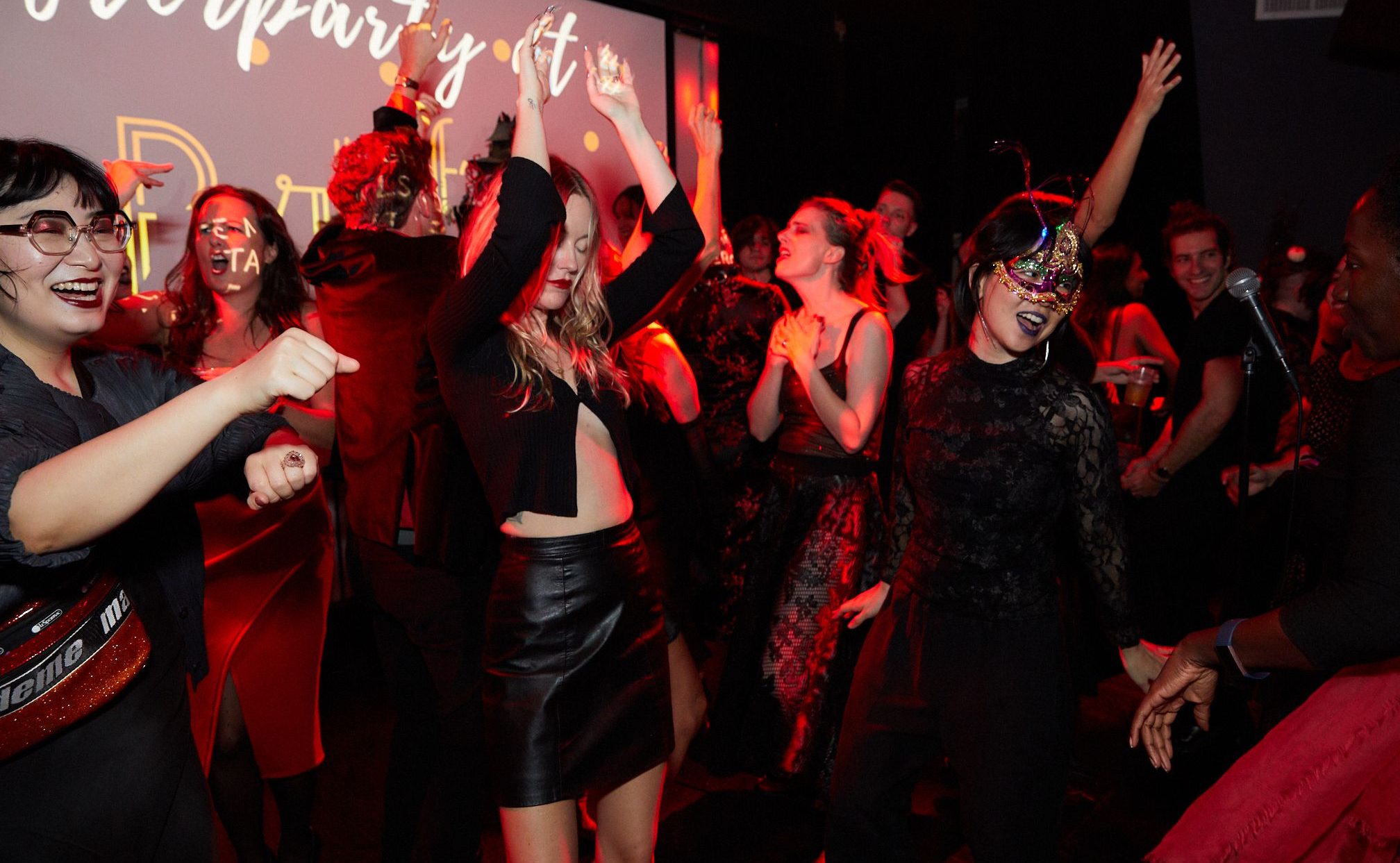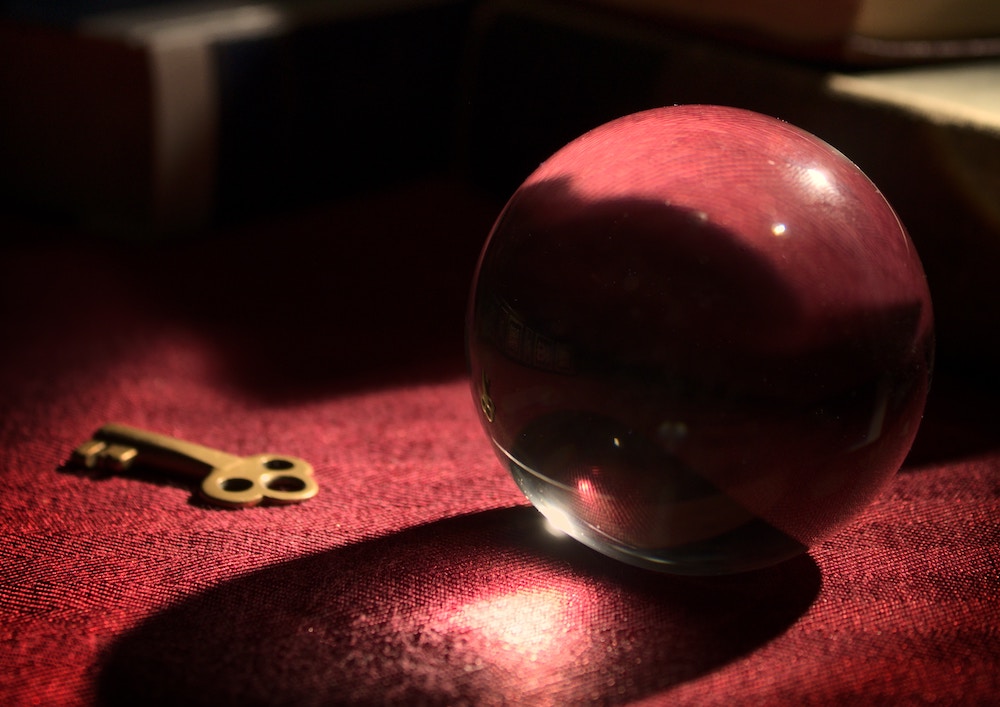news
Meanwhile, in California… Taking Back the Inland Empire @ UCR’s Writers Week
M

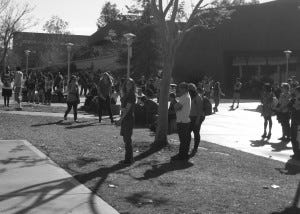
As I creep up exit 33 towards Blaine Avenue for the first time in a long while, I see the dusty parishioner that I expected to see. He holds a sign that simply says, “BAD TIMES- God bless you,” and though I drive by him like the cold-hearted bastard that I am, I still want to know his story. I consider it the first line of poetry of my day as I head towards my ol’ Alma mater, UC Riverside, to attend the final day of their 35th annual Writers Week. When I was a young & terrified creative writing student, Writers Week readings were my first exposure to literary events. These were people who were actually getting paid, so I went to as many events as I could and asked lots of questions. I didn’t want to become a college statistic — one of the go-nowhere, do-nothing writers our teachers told us that most of us would become. The readings were uncommonly good, too. I still laugh about Tod Goldberg’s noir short story about a Las Vegas rabbi/mafioso in hiding, and still smile about asking Joyce Carol Oates a question while wearing a Dead Milkmen t-shirt.
1. Fiery young poet and bookstore owner Polly Bee. I left the lens smudges on because they remind me of the ravens that have taken up residency at her Santa Cruz home. 2. Prose poet Gary Young: “I once knew a man who could only catch skunk…you could smell it on his breath, his skin…he wore a cloak of rancid pelts and when I saw him, I thought comrade.” 3. Poet, host, and my old teacher, Christopher Buckley. I remember him getting straight-up flabbergasted that none of us in the poetry workshop had ever heard of a jam closet or a cake safe. They sounded like a nicknames someone would give to their dad’s belly.
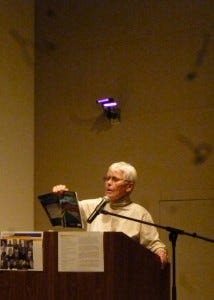
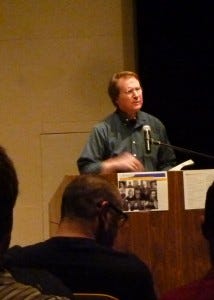
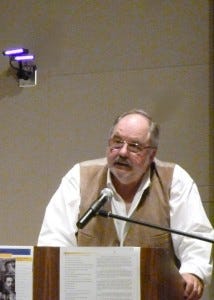
It claims to be the longest running free literary event in California, always offering a mix of fiction, non-fiction, poetry, new writers, experienced writers, panel discussions, and student workshops over four verbose days. This final day was to focus on poetry and prose poetry, which I feel could get away with being called flash non-fiction. The readers were selected and hosted by teacher and poet Christopher Buckley, and can I tell you from personal experience that his standards are ‘effen HIGH. He’s from the Fresno school of concrete, narrative poetry, and the day was chock full of it.
First up was poet and musician Alexander Long, whose work was filled with honest vulnerability and precise exploration. He’s been everything from a fry cook to an obituary writer, so his heart is a daring one — going to the dark places that we all need to visit, but never like going to. Before going into a group of poems about suicide, he recalled two friends of his that took their own lives when he was a teenager. “What do you with that when you’re thirty-nine? When you’re fifty? When you’re 18?” From his poem Reflections on A Suicide: “When I hear the flutter of a pigeon / I’m closer to the truth than anyone.” From his poem On Epiphanies, written in memory of a friend who killed themselves on Christmas Eve three years ago: “I’m not enjoying this, but work is love and is my new prayer…maybe good-bye will be the pen-ultimate epiphany.”
1. Keynote speaker and poetry legend, Diane Wakowksi. She is a wise hawk- one that has been watching. “Love, oh love, why invent this word if it is all zeros?”

Next was late-in-life poet Polly Bee, who wrote her first poem at The Santa Barbara Writers Conference at seventy. Now approaching eighty-six, she’s one of the most genuinely cool old ladies I’ve ever met, and I get jealous as I hear about the RV trips to Alaska she regularly takes with her two Jack Russell terriers. In a poem about a friend from a writing workshop that confesses to being afraid of horses, she wonders “where I can find a horse with the right kind of eyes?” She followed with a poem about “an alcoholic landlady name Jerry who boozed up my brother and took his cherry.” In “The Basque Hotel Noreaga,” she considers “a reality moving fast enough as to carve a canyon out of rock.” In her poem on assisted suicide, she asks, “What the hell is a mortal sin anyway?” In a piece she dedicated to Buckley, who was one of her first writer friends, she lets it be known that she is not interested in being born again as she accounts for “how long it took to become who I am / to not give a shit about what other people say.” During the Q&A that followed the reading, I asked if she has learned anything from animals that she has put towards her writing. “Horses, dogs, whatever,” she says, “handled right & patiently, there isn’t much they won’t do for you.”
Following third was Gary Young, one of Buckley’s oldest friends and collaborators. Young is a printmaker and heads up the poetry department at UC Santa Cruz — a place where cars are not allowed and the deer run free. He approaches poetry with a journalistic eye, giving his readers tight, quick, open-ended philosophies that they’re left to reckon with. “I don’t believe in God,” he says, “but I believe in something like God.” In a poem that Buckley requested, he states, “I once craved latitude. The ability to become someone better, someone strange. I realize slowly I have.” In a poem called “Starfish”: “It is always night. There are always stars.” He went on to discuss a land dispute in a Mexican court that a friend was wrapped-up in for twenty years, until he won. He didn’t make his flight home though — “He was found in an ally with his throat cut.” He ended with a timeless poem called “When I Was Five” about him losing a sweater, an item he called the first thing he ever really cared about. “I knew my sweater was not in heaven, but if it could disappear, just vanish without reason, then I could disappear, and God might lose me, no matter how good I was, no matter how much I was loved.”
1. Buckley’s undergrads posing with Young and keynote speaker, Diane Wakoski. These kids are Bizarro/Shelbyville versions of people that I graduated with, and I’m not sure what that means. 2. The post-reading, poetry-buying scramble.
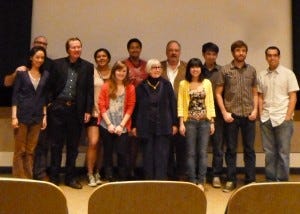
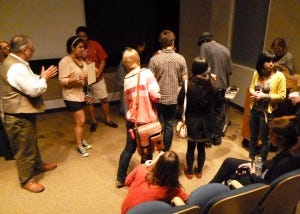
Closing out Writers Week was its keynote speaker, Diane Wakoski, who’s been publishing poetry since the ’70s, including a few books on the infamous Black Sparrow Press. She grew up in East Whittier in Orange County and can remember buying popsicles from Mr. & Mrs. Nixon at the Nixon’s family store. She wrote her poem, “The Butcher’s Apron,” about Dick Nixon’s brother, who became the store butcher after several real estate scandals. “The beauty of the red on the butcher’s white canvas…never translated to the food eaten.” While looking at her friend’s rare roast beef sandwich: “That puddle at the bottom of the bag was beef blood. There in the Lowell school cafeteria, I saw my first still life painting.”
Her pieces were followed by a deafening silence, allowing the audience to hear what had just been said. Her rhythms sucked me in and made me angry at my task at hand. I wanted to stop scribbling, stop chasing meaning, and just listen to her. In her poem “Madea, the Sorceress,” she considers, “how our dark, Dionysian civilization is built on light…It’s a paradox, which means it is true.” Mentioning how she grew up poor and obsessed with abundance (just like Biggie Smalls!), she read her poem “Pears”: “The beauty of fruit is not often enjoyed by the poor, but the rich have them on plates to ignore.” She ended with poems from her new book, Diamond Dog Poems, which takes it title from an intense and unforgettable childhood dream. In her dream, a scottie dog shaped like a diamond leaps out of the ashes of the pepper tree in her front yard and runs after her father, who is dressed in a sailor’s outfit. Calling the dog, “My own twinkling beast,” she feels the dream was a premonition of her father’s death. During the Q&A, the day’s token weird guy that has asked bizarre, loud questions to every reader officially made my day, as weird guys often do. He said, “Diamonds are a girl’s best friend. Dogs are man’s best friend. Paradox, huh?” Wakowksi ended the reading the way she says she ends all her readings, by declaring, “If there’s anything important you want to know about me, it’s in my poems.” Ain’t that the truth…
***
–David Ohlsen, an LA native, is a thoughtless product of UC Riverside’s Creative Writing program and is a regular contributor to Electric Dish.






